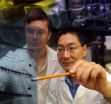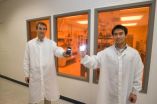Umbilical cord blood not suitable for assessing allergy risk
2010-10-06
(Press-News.org) Allergies occur when the defence mechanisms of the immune system malfunction and misread normal substances entering the body as invading pathogens. Antibodies are part of our biochemical arsenal for combating viruses, bacteria, parasites and other alien substances, but during an allergic reaction the antibody, known as IgE, is directed against usually harmless substances such as grass pollen, nuts, pets or eggs. Asthma and allergies are chronic diseases that reduce quality of life and pose an economic burden on society. New parents have therefore previously been asked if they would like hospitals to assess the risk their babies run of developing allergies in childhood. Hospitals tests the risk by measuring the amount of IgE in the blood of the umbilical cord. The results are then used to determine the need for allergy prophylaxis, e.g. whether babies need a special allergy-friendly milk substitute.
The biomarker originates from the mother
However, researchers from COPSAC (Copenhagen Studies on Asthma in Childhood) at the Faculty of Health Sciences, University of Copenhagen recently discovered indications that IgE in the blood of the umbilical cord could originate from the mother, and decided to conduct a focused study on this.
They measured the total amount if IgE in the blood of the umbilical cord in 243 new-borns. The researchers subsequently determined how much IgE originated from the mother by using hypersensitive analyses of IgE in the blood of the umbilical cord, blood from the mother, and blood from the baby six months after birth.
"We discovered that approximately half of the tests with increased IgE levels in the umbilical blood were due to IgE from the mother," Dr. Klaus Bønnelykke, PhD says. "This may explain why many studies have showed poor results from the use of umbilical cord IgE. In future, if we want to use blood from the umbilical cord for to assess the risk of an infant developing asthma or allergy we need to take the transfer of IgE from the mother into account. Or we will need to find another method."
The discovery has been published in the Journal of Allergy and Clinical Immunology.
INFORMATION: END
ELSE PRESS RELEASES FROM THIS DATE:
2010-10-06
Light drinking during pregnancy does not harm a young child's behavioural or intellectual development, reveals research published online in the Journal of Epidemiology and Community Health.
A previous study of 3 year olds drew similar conclusions, but the authors wanted to rule out possible delayed "sleeper" effects in older children.
They used data from the Millennium Cohort Study - a large study tracking the long term health of children born in the UK - drawing on a representative sample of 11,513 children born between September 2000 and January 2002.
Participants' ...
2010-10-06
The provision of made-to-order drugs ("specials") in primary care is expensive, often unnecessary, and associated with legal pitfalls, says the Drug and Therapeutics Bulletin (DTB).
It calls for a major overhaul of the practice, in a review of the evidence in this month's issue.
Bespoke drugs or "specials" are medicines made specifically to meet the needs of individual patients, so may be prepared in formulations and strengths which differ from those of standard licensed medicines.
They might be prescribed, for example, when a patient can't or won't swallow tablets ...
2010-10-06
A persistently noisy workplace more than doubles an employee's risk of serious heart disease, suggests research published online in Occupational and Environmental Medicine.
Young male smokers seemed to be particularly at risk, the findings showed.
The researchers base their findings on a nationally representative sample of more than 6,000 employees, aged from 20 upwards, who had been part of the US National Health and Nutrition Examination Survey (NHANES) between 1999 and 2004.
This involved detailed household interviews, to include lifestyle and occupational health, ...
2010-10-06
Therapeutic antibodies can be an efficient alternative when common drugs do not work anymore. However, antibodies obtained from blood of animals such as mice could not be used: The human immune system recognizes them as foreign and rejects them. In an international cooperation, scientists from the Helmholtz Centre for Infection Research (HZI) in Braunschweig, Germany have now succeeded in developing a promising approach to solve this problem; with the help of human stem cells they generated mice with a human immune system, which were then vaccinated to produce human monoclonal ...
2010-10-06
AUGUSTA, Ga. – The most toxic free radical appears responsible for much of the lung damage that can result from oxygen therapy in the critically ill or injured, Medical College of Georgia researchers report.
Within just a few days, ventilators and oxygen chambers used to significantly increase oxygen levels can also dramatically increase levels of peroxynitrite, an oxidant powerful enough to break down DNA and cause proteins to malfunction, said Dr. Yunchao Su, pharmacologist in the MCG Schools of Medicine and Graduate Studies.
Oxygen toxicity is the most severe side ...
2010-10-06
Montreal, October 05, 2010 – Working nine-to-five may be the way to make a living, but it may be padding more than the wallet. According to a new study from the Université de Montréal, office-workers have become less active over the last three decades and this decreased activity may partly explain the rise in obesity. Their findings, published in the early online edition of Preventive Medicine, may have health implications for the millions of people toiling behind their desks.
"People eat better and exercise more today than they did in the 1970's, yet obesity rates ...
2010-10-06
Today's Oct. 4 issue of the high-impact journal, Applied Physics Letters, contains a new electrofluidics design from the University of Cincinnati and start-up company Gamma Dynamics that promises to dramatically reshape the image capabilities of electronic devices.
This patent-pending electrofluidics breakthrough by the Novel Devices Laboratory at the University of Cincinnati and partner companies Gamma Dynamics, Dupont and Sun Chemical follows about seven years of work. According to lead researcher Jason Heikenfeld, UC associate professor of electrical and computer engineering ...
2010-10-06
EAST LANSING, Mich. — Fish oil – long encouraged by doctors as a supplement to support heart and joint health, among other benefits – induced severe colitis and colon cancer in mice in research led by Michigan State University and published this month in the journal Cancer Research.
Jenifer Fenton, a food science and human nutrition researcher at MSU, led the research that supports establishing a dose limit for docosahexaenoic acid (DHA), one of the omega-3 fatty acids present in fish oil, particularly in people suffering from chronic conditions such as inflammatory bowel ...
2010-10-06
A balloon angioplasty device that sucks up dangerous plaque debris could trigger a "paradigm shift" in how physicians treat peripheral artery disease, researchers write in the current issue of Endovascular Today.
"We will see a shift in how we treat lesions," write Dr. Robert Dieter of Loyola University Health System and Dr. Aravinda Nanjundappa of West Virginia University.
In two clinical trials totaling 123 patients, the device had a success rate of 97 percent to 99 percent and consistently outperformed filter devices typically used to capture debris particles, Dieter ...
2010-10-06
GRAND RAPIDS, MICH., Oct. 5, 2010 – Only about a third of American women are meeting their fruit and vegetable intake recommendations, which means they are likely missing out on potentially important breast and ovarian health benefits (1). Along with vitamins, minerals and fiber, fruits and vegetables contain a type of phytonutrient called carotenoids, which research suggests help support women's health including breast and ovarian health.
Based on a new report called America's Phytonutrient Report: Women's Health by Color, older women have total carotenoid intakes ...
LAST 30 PRESS RELEASES:
[Press-News.org] Umbilical cord blood not suitable for assessing allergy risk

